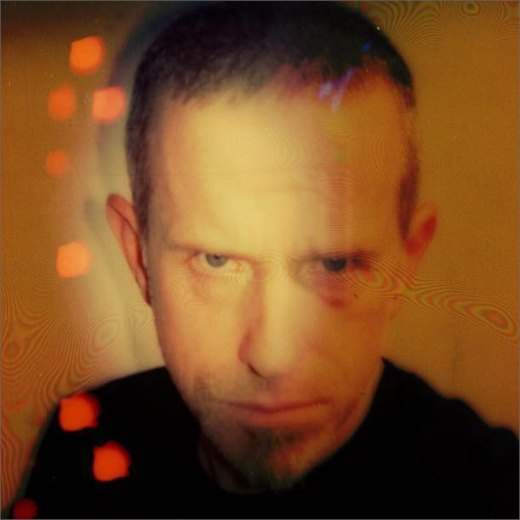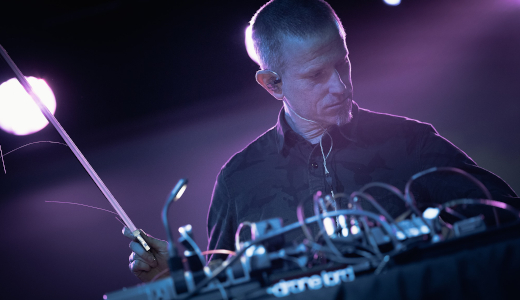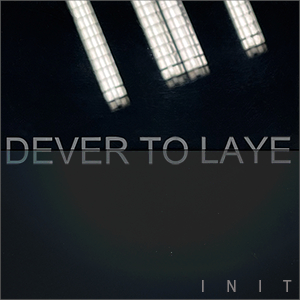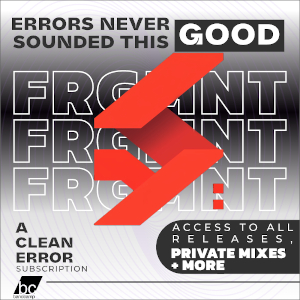Enjoying a certain amount of risk in any endeavor

Nathan :: That resonates with me so much. I think the reason that it resonates with me so much is that when I sit down to work on something, if I don’t have butterflies in my stomach –
CRT :: Yeah?
Nathan :: And that sense that what I’m about to do could totally fail, whether it’s an album or a live show. If I’m too comfortable going into it…
CRT :: Yeah!
Nathan :: The results are never as good. I want to get over releasing it, or I feel really bad about how the show went. Now I love going into something where either there are intrinsic or extrinsic limitations that are put upon me that force me to work outside of my normal patterns. If I’m playing live, my days of having a beer before a show are over, because it calms me down. It should get out. If I’m not on tenterhooks going into a project or a performance, it suffers.
CRT :: I get that! You want to go out being anxious like it could all fall apart. It could either suck or shine.
Nathan :: Yeah. I know that maybe that’s just an expression of my risk profile, and I personally accept and enjoy a certain amount of risk in any endeavor that I undertake. It’s through experience that I’ve realized that if I fail, I’m probably not going to kill anybody.
CRT :: Yeah, unless you’re working with giant metal sculptures in a school bus full of kids or something.
Nathan :: I am not Mark Pauline from Survival Research Laboratories. If the blade comes off a circular saw I’m using for my percussion part from where I die I’m not doing that.
CRT :: That is hilarious. Now it’s funny because I feel like every New Year’s Day I look at my music like a blank slate. All the songs from the last year are done and in their folder or whatever. What do I want to do this year? What’s something I’m interested in doing? And what I’ve noticed in the last couple of years is these certain things have begun to creep into my music subconsciously. Like, I would say about five or maybe six years ago before my first EP came out (Tribal Malfunctions on Component) I made good passable electronics stuff, but it was careful.
Nathan :: That is an interesting adjective to use.
CRT :: Yeah. I was like, “Okay, I want to do cool stuff but I don’t want to go too crazy. I don’t want to go way out to where I secretly want to go. I’ll stay here where it’s comfortable.” What’s also interesting is over the past four or five years I learned a little bit more technical skills from talking to people like my friend Seth who is an engineer in New York. And also from talking to you and my friend Kent Williams. I started to realize like “Okay, I shouldn’t blow my levels out but instead maybe bring them down to minus 20db or something. Just edge them up a little bit instead ‘everything is in the red and there’s no headroom!” So learning a little more control, a little more degree of skill. I also started to explore different ways of programming. Like I’m the first to admit I’ve spent the last 25 years chasing on Autechre’s coattails. “Oh my god, what are they doing?” Of course those guys have been in outer space since 2000 when they released Confield (Warp) but I’m often thinking about the stuff they’ve done past and present. Not just them but other musicians who I really admire. So I’ve started to mess with my sound more in the last couple of years; a little more dissonance, a little more de-tuning of sounds. Not alternate tunings because I think I need more theory under my belt before I start doing that. But just being more comfortable with being more experimental and less trying to be in control. Part of that started with letting my songs be longer.
Nathan :: Right.
CRT :: Which most people don’t like. But my friend Jay is the guy I play all my stuff for before anybody else hears it. For my album Who woke the demons that broke down the system? (Ohm Resistance, 2021), and Jay’s like, “It’s an hour and 40 minutes, huh?” and I’m like, “Yeah. And?!” And he’s like “You can cut it down a little bit” and I’m like, “What do you mean?!”
Nathan :: That’s very defensive.
CRT :: I’m super defensive about my music anyway, but now especially because for the last year and a half I haven’t been able to go out and do anything else. My thing is to clock out of work turn to the left of my work desk and start playing music.
Nathan :: And just go!
CRT :: It just goes until a song is done! Then, I listen to it over and over and over again.
Nathan :: That’s what I like about your music. There aren’t a lot of people who dedicate themselves to long-form, kind of epic, evolving tunes like that. I think it would be kind of hilarious and awesome if you were the artist where for you an EP is like 50 minutes. You get three or four tracks, 50 minutes and you…
CRT :: What do you mean? [LAUGHS] I am! I released a single that’s almost 40 minutes long because it’s two nineteen-minute songs (Firewatcher, Condition Human.)
Nathan :: This is why you and I get along so well, I think. It’s that I appreciate the full end-to-end and focused on the listening experience. That’s how I want to experience music. You will never find anything in my house, in my car, on my devices, in shuffle mode. I just never do it.
CRT :: Really? Will you listen to an album like something from end to end, start to beginning?
Nathan :: I almost never listen to anything in any other way.
CRT :: Interesting. See, I will do that, too, but I’m curious what a younger musician would say. I’m very much of the mind of that an album is a perfect document. Like Beastie Boys’ Paul’s Boutique is meant to be heard in sequential order and on vinyl if possible. It’s got to be that way. Or like when I go upstairs and my kids were listening to “Pocket Calculator” by Kraftwerk. If certain albums like Computer World or Remain In Light by Talking Heads, come on I will have to stop and go to the first song on that album and listen to it from beginning to end.
Nathan :: Dude, brother from another mother. Absolutely!
CRT :: Right? The thing with shifting towards long-form songs was a big thing for me. A couple of years ago I thought, “You know what? I’m going to do 8, 9, 10 minute long songs. Whatever it takes to get the point across. Who cares what people think? I don’t give a shit“.
Nathan :: I think in this day and age in our world of streaming media to do so is slightly or deeply subversive.
CRT :: It is! Here’s the thing that—and I promise maybe some day we’ll start to talk about your album again—I remember when CDs first came out the conversations started to be like, “What does an album have to be like? How long does it have to be?” Now lately in the last year I’ve really been railing at people complaining about a song or album’s length saying, “My music is not too long. Your mind is conditioned as mine was to think that a song must be three and a half minutes long, maybe three minutes or so.“
Nathan :: Even our culture has tried to train us in that mindset since the 1950s.
CRT :: Exactly! It’s got to fit this codification that started with vinyl! Then when digital media came out, it was like, “Why not write really long songs?” I was too chicken then but I remember there was a big rash in the late 90s, early 2000s with like Plastikman or Autechre where you’d either have a secret track hidden in the beginning of the album. On a lot of IDM CDs you would have a song at the end that was 20 minutes long but was 12 minutes of silence or something. Then it would slowly fade up to something ‘hidden.’ Also I remember reading an interview with Autechre around maybe 1996 or 1997 where they were like, “We’re really interested in slowing things down,” which is ironic given that a few years later, they released “Gantz Graf” which is like…
Nathan :: Yeah.
CRT :: It’s like a sample of every garbage can in New York City being upturned at once.
Nathan :: Yeah.
CRT :: Ultimately I realized “Your song can be whatever length it is! Some songs are six minutes and some are twelve.” Like for the “Firewatcher” single those two songs are 19 minutes long. I played it for my friend Kent and he’s like “Dude, why is it so long? Fuck.” And I was like, “Dude what?” Then I played it for my friend Jay, he’s like, “Meh. Too long.” So after going back to the studio I played them a shorter version that was 12 minutes long and they’re like, “Nah, it doesn’t work, it’s not the length of the song.” I was like “Well, what the hell is it?” Eventually, I figured it out it wasn’t the length, it was something else. So in desperation I did one of my favorite things to do which is to go “Oh! You want something else? Here, have a straight 4/4 kick drum and high hat on the up note, every 3rd of beat.” I sent that to Jay who said “That’s the one! That’s it.” And I’m like, “Son of a bitch. That’s all it took? A kick drum?” He said, “Yeah.” I was like “Ah, they’re fucking right.” And when I released it I included the original mix anyway because I still think that the first one really works.
Now, getting back to Nathan here, I guess all of that being said, I totally see all that woodshedding you went through for three or four years. What time period was this? And when did you start to have the realization while brushing your teeth? When did you start to be like “Okay, I’m comfortable releasing this to people“?
Nathan :: That would be 2012 to 2015.
CRT :: Wow, that late? That’s interesting.
<< previous page | next page >>


















![Allmanna Town :: 1911 EP (Self Released) — [concise]](https://igloomag.com/wp/wp-content/uploads/2025/03/allmannatown-1911_feat2-75x75.jpg)


